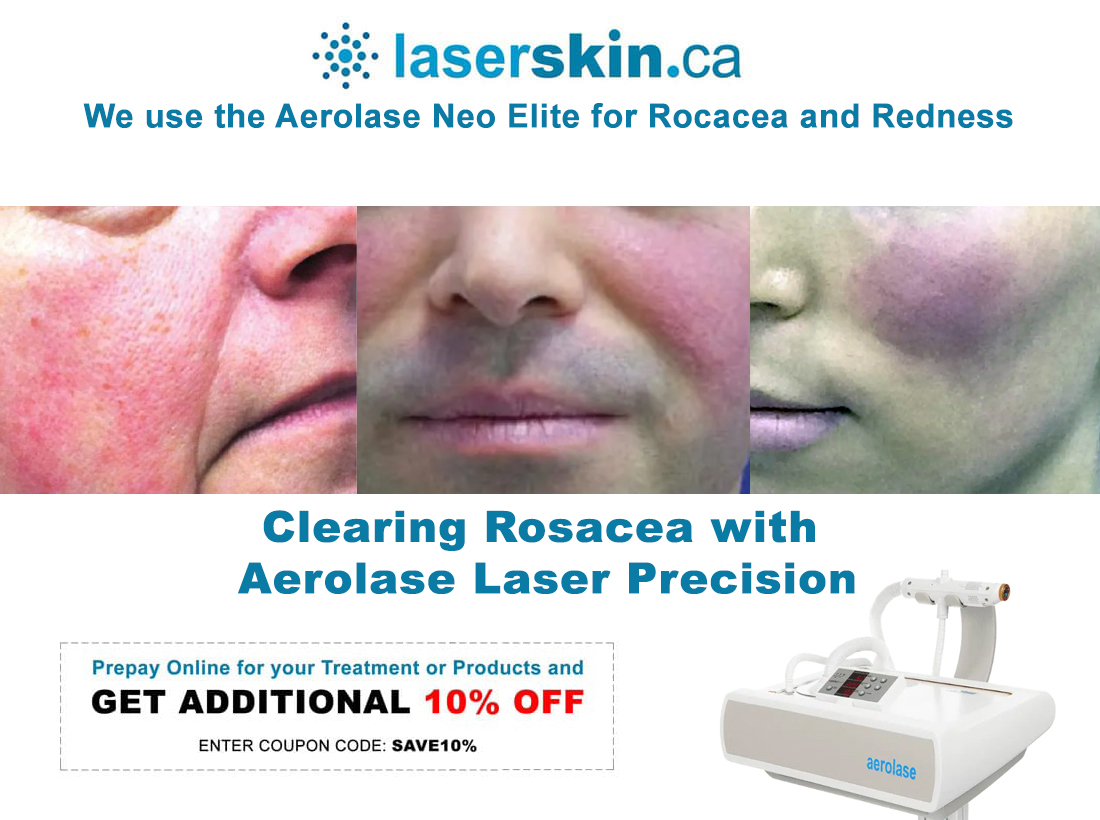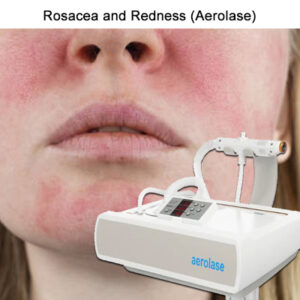
-
Quickview
Rosacea and Redness
$450.00 – $2,025.00Price range: $450.00 through $2,025.00 Select options This product has multiple variants. The options may be chosen on the product page
Clearing Rosacea with Aerolase Laser Precision
Rosacea, a chronic skin condition affecting millions worldwide, poses challenges beyond physical symptoms. Understanding this condition is pivotal in devising effective long-term strategies for management and potential resolution. It’s characterized by facial redness, visible blood vessels, and often small, red, pus-filled bumps. Despite being a chronic condition, targeted treatments and lifestyle adjustments play crucial roles in alleviating symptoms and, in some cases, achieving long-term remission.
The impacts of Rosacea extend beyond its physical manifestations, infiltrating emotional well-being and self-esteem. The constant visibility of facial symptoms can significantly affect an individual’s self-confidence and social interactions. The emotional toll associated with Rosacea cannot be overlooked, emphasizing the importance of addressing physical and psychological symptoms.
Understanding the diverse types of Rosacea, ranging from papulopustular and erythematotelangiectatic to ocular and phymatous, provides insight into the varying presentations and appropriate treatment approaches. Each type may manifest its distinct symptoms, necessitating tailored treatment strategies to manage and alleviate specific concerns.
Conventional medical treatments for Rosacea typically encompass antibiotics and retinoid creams, aiming to reduce inflammation and minimize flare-ups. However, emerging treatments, such as Aerolase laser therapy, offer a novel approach, targeting blood vessels and reducing redness and visible symptoms associated with Rosacea.
Lifestyle modifications serve as complementary strategies in managing rosacea symptoms. Diet plays a significant role, with some individuals reporting triggers from spicy foods, alcohol, or hot beverages.
We are implementing methods to manage stress and adhering to a regular skincare regimen designed for sensitive skin to minimize flare-ups and preserve skin well-being. Exploring alternative treatments like herbal remedies, probiotics, and acupuncture showcases a growing interest in holistic approaches to managing rosacea symptoms. While scientific evidence supporting these alternatives varies, some individuals find relief through complementary therapies.
Preventing future flare-ups involves:
Identifying and avoiding triggers specific to an individual’s condition.
Establishing a regular skincare regimen.
Adopting healthy lifestyle choices.
Vigilance in recognizing triggers, environmental factors, certain foods, or stress contributes significantly to symptom management.
Concluding whether Rosacea can be permanently eradicated poses a complex question. While complete eradication may be elusive, maintaining remission through consistent management strategies is achievable. Navigating setbacks by revisiting treatment plans, identifying triggers, and maintaining a proactive approach toward skincare is pivotal in managing Rosacea effectively.
While achieving total elimination of Rosacea might be unattainable, the strategies outlined form a comprehensive approach to mitigate symptoms, sustain remission, and enhance the overall well-being of individuals grappling with this persistent skin condition.
Q&A
What is Rosacea?
Rosacea represents a chronic skin ailment identified by facial redness, apparent blood vessels, and, occasionally, small red, pus-filled lesions.
What are the impacts of Rosacea beyond its physical symptoms?
Rosacea extends beyond physical symptoms, affecting emotional well-being and self-esteem due to its visibility and impact on social interactions.
What are the different types of Rosacea?
Rosacea includes papulopustular, erythematotelangiectatic, ocular, and phymatous types, each exhibiting distinct symptoms and requiring tailored treatments.
What are the conventional medical treatments for Rosacea?
Conventional treatments for Rosacea involve antibiotics, retinoid creams, and emerging therapies like Aerolase laser treatment, aiming to reduce inflammation and visible symptoms.
How do lifestyle modifications aid in managing Rosacea symptoms?
Modifying lifestyle habits, including adjusting diets, managing stress, and committing to a specific skincare regimen, aids in minimizing flare-ups and preserving the health of the skin.
What are some alternative treatments for Rosacea?
Alternative treatments include herbal remedies, probiotics, and acupuncture, offering holistic approaches to manage Rosacea symptoms for some individuals.
How can one prevent future Rosacea flare-ups?
Preventing flare-ups involves:
Identifying triggers.
Maintaining a regular skincare routine.
Making healthy lifestyle choices tailored to individual sensitivities.
Is it possible to permanently eradicate Rosacea?
While complete eradication may not be feasible, maintaining remission through consistent management strategies and proactive skincare is achievable.
What are the challenges in navigating setbacks with Rosacea?
Setbacks in Rosacea management require revisiting treatment plans, identifying triggers, and maintaining a proactive approach toward skincare.
Can managing Rosacea effectively improve the overall quality of life?
Yes, comprehensive management strategies for Rosacea aim to alleviate symptoms, maintain remission, and improve the overall quality of life for affected individuals.
Book Your Free Consultation Today Or Call (647) 560-9233
By providing your phone number you agree to receive informational text messages from laserskin.ca. Consent is not a condition of purchase. Message frequency will vary. Msg & data rates may apply. Reply HELP for help or STOP to cancel.

